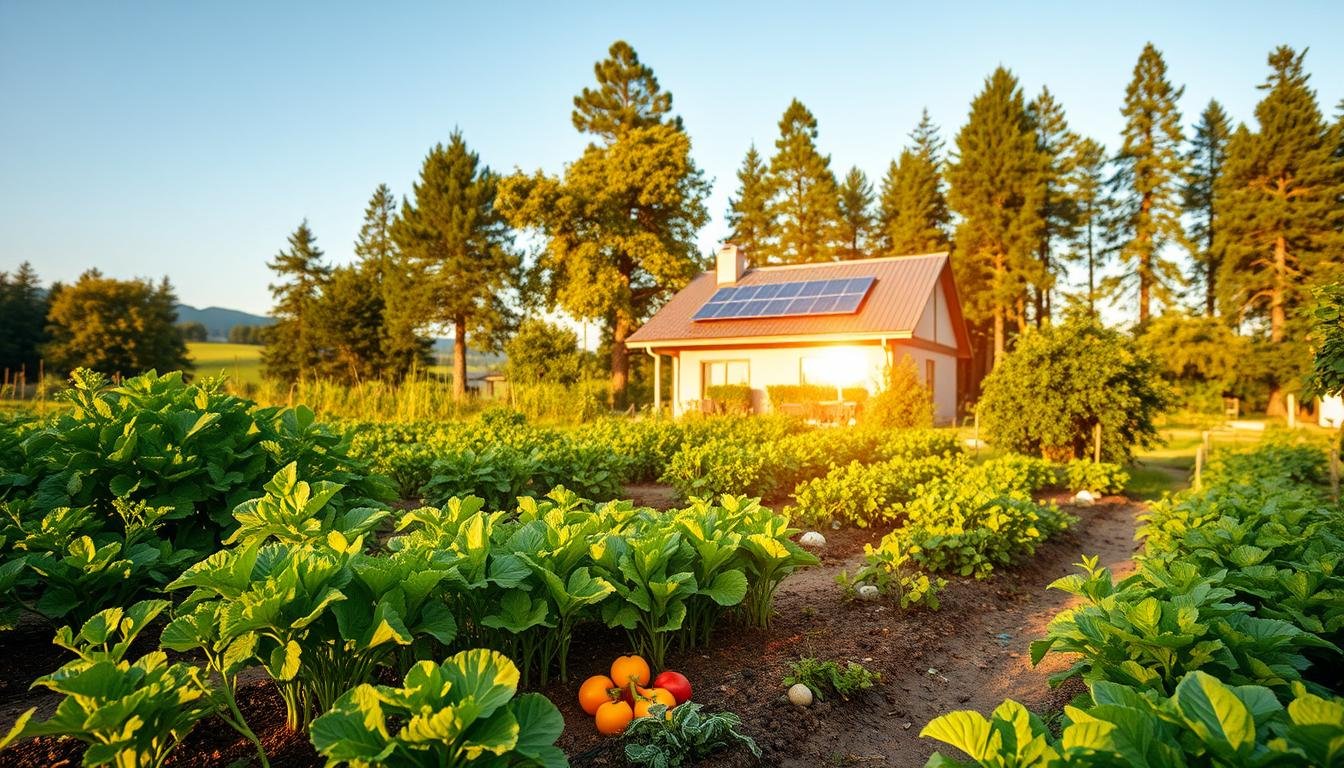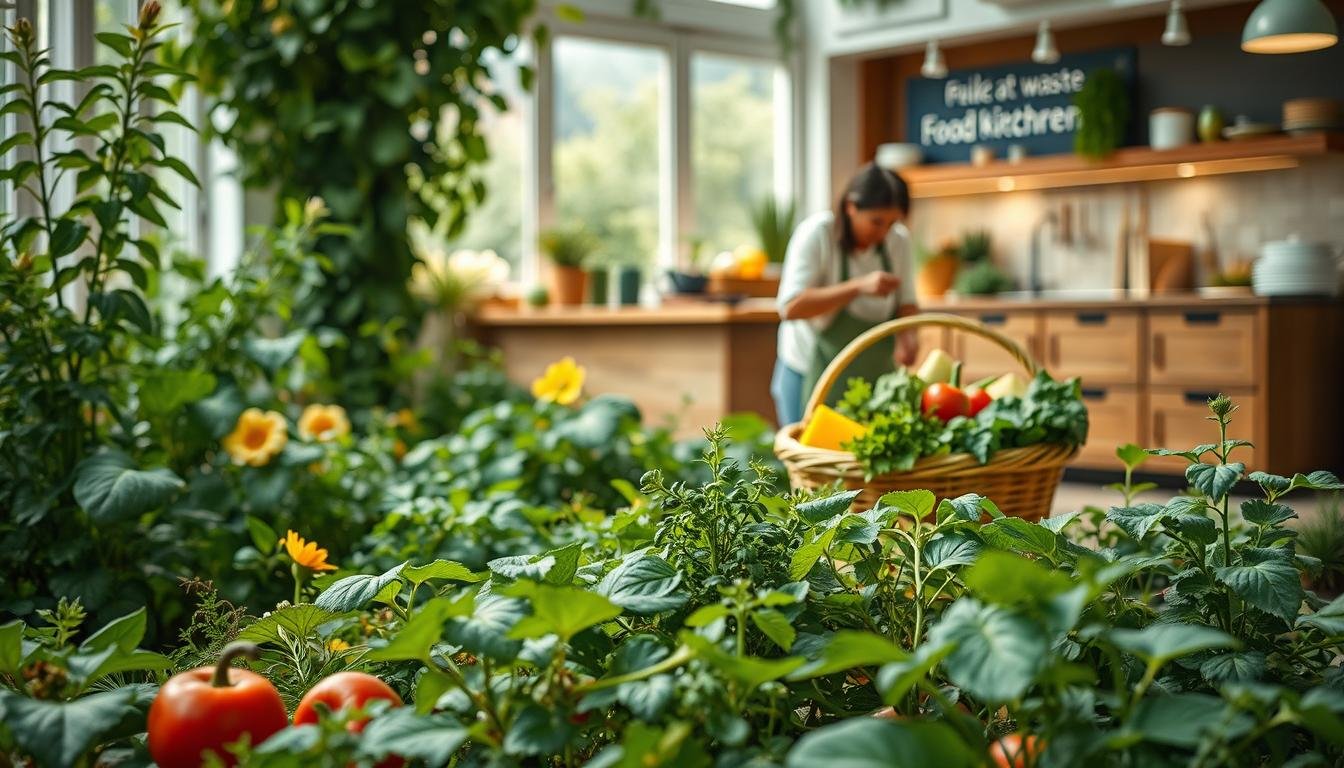Did you know that 93% of people have traces of BPA from plastics in their bodies? Single-use items harm our planet every day. Yet, small changes in our routines can make a big difference.
Switching to ethical alternatives doesn’t mean sacrificing convenience. Practical solutions exist for reusable household items and toxin-free personal care. This guide explores easy swaps to cut waste and protect the planet—without breaking the bank.
Key Takeaways
- Plastic pollution affects wildlife and human health.
- Simple swaps reduce waste and carbon footprints.
- Affordable, durable alternatives outperform single-use items.
- Certifications help identify trustworthy sustainable products.
- Every small change contributes to a healthier planet.
Why Choose Eco-Friendly Options for a Greener Life
Plastic waste isn’t just pollution; it’s a health crisis. Only 9% of all plastic ever made gets recycled. The rest lingers for 500 years, leaching toxins like BPA—linked to cancers and hormone disruption.
Small swaps create big change. Choosing plant-based meats cuts water use by 87% compared to beef. Shampoo bars save three plastic bottles yearly per person. Even rechargeable batteries trim $200+ from costs over five years.
Vegan leather avoids toxic tannery chemicals, protecting waterways. Brands like Bellroy and Modibodi prove ethical labor and sustainability can coexist. The zero-waste hierarchy—refuse, reduce, reuse, recycle—guides smarter choices without sacrificing convenience.
Health risks shrink when we ditch single-use plastics. Reduced toxin exposure means fewer allergies and long-term diseases. Every sustainable switch lowers your carbon footprint and environmental impact, paving the way for a healthier life.
Home and Kitchen Essentials for a Sustainable Household
Your kitchen holds the power to slash waste with simple swaps. From toothbrushes to food storage, durable alternatives cut landfill contributions while saving money long-term.
Bamboo Toothbrushes and Beeswax Wraps
Bamboo toothbrushes decompose in 6 months, unlike plastic versions lingering for 500 years. Brands like Georganics pair them with toothpaste tablets in glass jars, eliminating plastic tubes.
Beeswax wraps replace cling film, lasting a year with hand-washing. HoneyBee’s reusable wraps prevent 8 million tons of ocean plastic annually. Just warm them with your hands to seal leftovers.
Cast Iron Cookware and Glass Containers
A Lodge cast iron skillet survives 100+ years with proper seasoning. It outlasts nonstick pans, which shed microplastics into food.
Glass containers emit 30% less CO2 during production than plastic. Ever Eco’s silicone pouches replace 300 Ziploc bags yearly, while Little Pepino’s baking mats ditch parchment paper waste.
Pro tip: Store acidic foods in glass to prevent cast iron rust. For compost, Wombat bins divert 400 lbs of food waste per household annually.
Personal Care Products That Reduce Waste
The bathroom is a hidden hotspot for single-use waste, but smarter personal care choices can turn the tide. Simple swaps like shampoo bars and menstrual cups slash plastic use while saving money. Ethique’s shampoo bars last twice as long as bottled versions, preventing 3 plastic bottles per year.
Shampoo Bars and Menstrual Cups
Shampoo bars like by Humankind’s carbon-neutral formulas skip plastic bottles entirely. A single bar replaces 2–3 liquid bottles, cutting waste and shipping emissions. For period care, Modibodi’s underwear replaces 12,000 disposable products over its lifespan.
Menstrual cups are a game-changer. Saalt’s reusable cups cost $30 but save $840 over 10 years compared to tampons. They’re FDA-approved and free from toxins found in conventional products.
Biodegradable Dental Floss and Organic Skincare
Happy Sparrow’s silk floss prevents 180 plastic containers per lifetime. Pair it with Georganics’ toothpowder in metal tins for a zero-waste routine. Miswak sticks offer another plastic-free alternative to toothbrushes.
Skincare brands like Naked Soap Company use avocado oil and PFAS-free certifications. Beware of greenwashing—look for EWG verification to avoid hidden chemicals. Dew Mighty’s serum bars replace liquid products, reducing packaging waste.
Sustainable Clothing and Accessories for Every Wardrobe
Fast fashion fuels pollution, but sustainable clothing offers a cleaner alternative. The industry accounts for 10% of global carbon emissions, yet innovative materials and designs are changing the game. From recycled polyester to plant-based leather, these choices cut waste without sacrificing style.
Recycled Polyester and Vegan Leather
Recycled materials like polyester from plastic bottles reduce landfill waste. Nimble Activewear transforms 12 bottles into each pair of leggings, matching the quality of virgin fabrics. Vegan leather, such as Pinatex made from pineapple leaves, avoids animal cruelty and toxic tannery chemicals.
Afends’ hemp clothing uses 50% less water than cotton, proving sustainability scales. Tencel lyocell, sourced from FSC-certified wood pulp, offers a silky alternative with minimal environmental impact.
Bamboo Socks and Modular Clothing
Bamboo socks outlast cotton by 2x and resist odors naturally. For versatility, Eileen Fisher’s reversible jackets and Patagonia’s Fair Trade Certified collections embrace modular designs. These pieces adapt to seasons, reducing overconsumption.
Did you know? Synthetic fabrics shed 700,000 microplastic fibers per wash. GUPPYFRIEND washing bags capture 90%, protecting waterways. Pair them with cold washes to further slash your carbon footprint.
Eco-Friendly Food and Beverage Choices
What we eat and how we shop directly impacts our environmental footprint. Simple changes in our food routines can prevent tons of waste while supporting sustainable systems. From reusable containers to plant-based proteins, smarter choices benefit both people and the planet.
Reusable Shopping Bags and Bulk Food Purchases
Reusable bags prevent 300 plastic bags from entering landfills each year. Opt for durable options like Baggu’s recycled nylon totes or ChicoBag’s compact designs. For produce, Organic Cotton Mart’s mesh bags keep items fresh without plastic waste.
Bulk buying cuts packaging dramatically. Start with pantry staples:
- Rice: 5-10 lb quantities stay fresh for months
- Beans: 3-5 lb amounts work for most households
- Spices: Buy small amounts to maintain potency
Local CSAs (Community Supported Agriculture) reduce transport emissions by 60%. Farms like Full Belly Farm deliver seasonal produce while supporting regional growers.
Plant-Based Meats and Compostable Coffee Pods
Beyond Meat generates 90% fewer greenhouse gases than beef production. Their pea protein burgers use 46% less energy than traditional patties. For breakfast, JUST Egg’s plant-based scramble uses 98% less water than chicken eggs.
Compostable coffee pods break down in 6 weeks versus 500 years for plastic. Pod Star’s stainless steel capsules work with Nespresso machines, while GreenCane’s sugarcane containers decompose completely. Who Gives a Crap pairs sustainability with social impact—50% of profits fund sanitation projects.
These choices prove that sustainable food systems can be convenient, affordable, and delicious. Every mindful purchase helps build a healthier future.
Green Technology and Office Supplies
Tech upgrades can slash your carbon footprint without sacrificing performance. Sustainable office tools now blend innovation with responsibility, from solar-powered gadgets to waste-free writing supplies. Small swaps add up—like LED bulbs cutting energy use by 75% compared to incandescent lights.
Solar Chargers and Recycled Paper
Solar chargers like Solgaard’s backpacks can charge four devices at once. They offer 20W output. For paper needs, Rocketbook’s reusable notebooks can save over 1,000 sheets a year. Using FSC-certified recycled paper can double the impact.
Recycled materials are common in offices today. HP’s cartridges have 5%–45% post-consumer plastic. Greenerprinter uses vegetable-based inks. Aspen’s aluminum pens and Ecoroots’ plantable pencils show that sustainability can be stylish.
Biodegradable Phone Cases and LED Bulbs
Pela’s 100% compostable phone cases break down in months, not centuries. LEDs last 25 times longer than traditional bulbs. Over five years, they save more than $200 per household.
Onya’s stainless steel bottles can prevent 1,460 plastic bottles from being used each year. Pro tip: Use Energy Star-certified electronics for even more efficiency. Every switch helps reduce waste and lower energy bills.
Zero-Waste Cleaning Solutions for Your Home
Many cleaning tools hide plastics, but smart swaps can eliminate them. Ecyo’s dissolvable pods replace 30 plastic bottles yearly. DIY cleaners cost just $0.12 per bottle, much less than commercial brands.
Most scrubbers shed microplastics. Swap them for natural sisal dish brushes or Marley’s unpaper towels. These alternatives last longer and don’t pollute waterways.
Make your own cleaners at home:
- Citrus vinegar spray: Mix citrus peels with vinegar for a degreaser.
- Baking soda paste: Clean sinks and tubs without harsh chemicals.
Certifications are important. EPA Safer Choice ensures products meet strict standards. Ecologo verifies sustainability. Blueland’s refill stations cut packaging by 70%, making cleaning smarter.
Brands like Dropps and Seventh Generation make zero-waste cleaning easy. Their plant-based formulas and refill systems help you ditch single-use plastics for good.
Eco-Friendly Pet Care Products
The pet industry’s plastic problem has solutions. 300 million pounds of plastic from pet products go to landfills yearly. But biodegradable alternatives now break down in months, not centuries.
Beco’s compostable poop bags decompose in 3 months, unlike traditional plastic bags that last over 100 years. West Paw uses 95% recycled plastic in indestructible fetch rings. Earth Rated’s bamboo brushes tackle shedding without synthetic materials.
Nutrition is key too. Open Farm’s carbon-neutral kibble sources ingredients regeneratively. The Honest Kitchen delivers plastic-free meals via subscription, cutting packaging waste.
DIY solutions shine. Turn old sweaters into braided rope toys or stuff socks with crinkled paper for cats. Redecker’s wooden brushes with pig bristles groom sustainably.
Ethique’s pet-safe cleaners avoid toxins, while Juturna’s bamboo combs prevent microplastic shedding. Every swap reduces your pet’s pawprint—without compromising their health or happiness.
Travel and Outdoor Gear with a Low Carbon Footprint
Your next trip can support ocean cleanup by choosing the right luggage. Solgaard’s suitcases remove 5lbs of plastic from waterways per purchase, woven into durable shells. Sand-free towels like those from Nomadix transform 20 recycled bottles into quick-drying beach essentials.
Recycled nylon outperforms virgin materials, using 50% less energy during production. Cotopaxi leads with packs made from deadstock fabric, while United By Blue removes 1lb of trash for every product sold.
Pack these adventure essentials:
- Klean Kanteen bottles keep drinks cold for 24 hours without single-use plastics
- Chaco sandals with recycled polyester straps handle trails and rivers alike
- Bamboo utensil sets replace disposable cutlery in any backpack
Smart travelers complete this checklist:
Simple Swaps for a Sustainable Lifestyle
- Reef-safe sunscreen to protect marine ecosystems
- Solar-powered GPS devices for off-grid navigation
- Collapsible silicone containers for waste-free snacks
Offset flight emissions through programs like Cool Effect. They have verified projects that reduce carbon and help global communities. Every gear choice affects our planet’s future.
Supporting Ethical Brands and Sustainable Practices
Every dollar spent on ethical brands helps our planet. Patagonia’s Worn Wear program cuts CO2 by 73% through repairs. TOMS has given 100M+ pairs of shoes through their one-for-one model.
Choose brands with B Corp certification. They score 80+ in governance, workers, and environment. Allbirds discloses factory details, while H&M’s reports sometimes lack supply chain info.
These efforts make a difference:
4ocean removes one pound of plastic per product sold. Tentree plants 10 trees for every item. VEJA uses recycled plastic in shoes and pays fair wages.
Verify claims with these resources:
The Good On You app rates brands on labor and environment. Fashion Revolution’s transparency index uncovers greenwashing. Shareholder activism pushes for sustainability reports.
Christy Dawn and Wholesome Culture show ethical brands can succeed. They use deadstock fabrics and donate to charity. Your choices support this movement.
Conclusion: Making Eco-Friendly Choices Easier Every Day
Small daily changes can make a big difference. 79% less plastic waste is possible with these swaps. Each household can save 10,000 lbs of CO₂ yearly.
Start with a 30-day plastic audit. Then, upgrade every quarter with reusable items or LED bulbs. Supporting ethical brands helps communities and creates jobs.
Share your journey with #ZeroWasteJourney. Use Earth911’s recycling locator or EWG’s Healthy Living app for more tips.
Your choices shape the future. Together, we build a healthier life and planet—one mindful decision at a time.
FAQ
What are the best alternatives to plastic in the kitchen?
Swap plastic wraps for beeswax wraps and use glass or cast iron. These options reduce waste and last longer.
How can I make my personal care routine more sustainable?
Try shampoo bars, menstrual cups, or biodegradable dental floss. Organic skincare products also reduce harmful chemicals.
What clothing materials are better for the planet?
Look for recycled polyester, vegan leather, or bamboo socks. Modular clothing reduces waste in your wardrobe.
What are easy ways to shop for food sustainably?
Bring reusable bags, buy in bulk, and choose plant-based meats. Compostable coffee pods also reduce trash.
How can I reduce my carbon footprint with tech and office supplies?
Solar chargers, recycled paper, and biodegradable phone cases are great. LED bulbs save energy and last longer.
What cleaning products are better for the environment?
Use zero-waste solutions like vinegar, baking soda, or refillable cleaners. They avoid harsh chemicals and packaging.
Are there sustainable options for pet care?
Yes! Look for biodegradable poop bags, organic pet food, and toys made from recycled materials.
What travel gear has a lower environmental impact?
Choose reusable water bottles, bamboo utensils, and solar-powered gear. Lightweight, durable items reduce waste on the go.
How do I find ethical brands that align with my values?
Research companies with fair trade certifications, recycled materials, and transparent supply chains. Supporting small businesses also helps.





